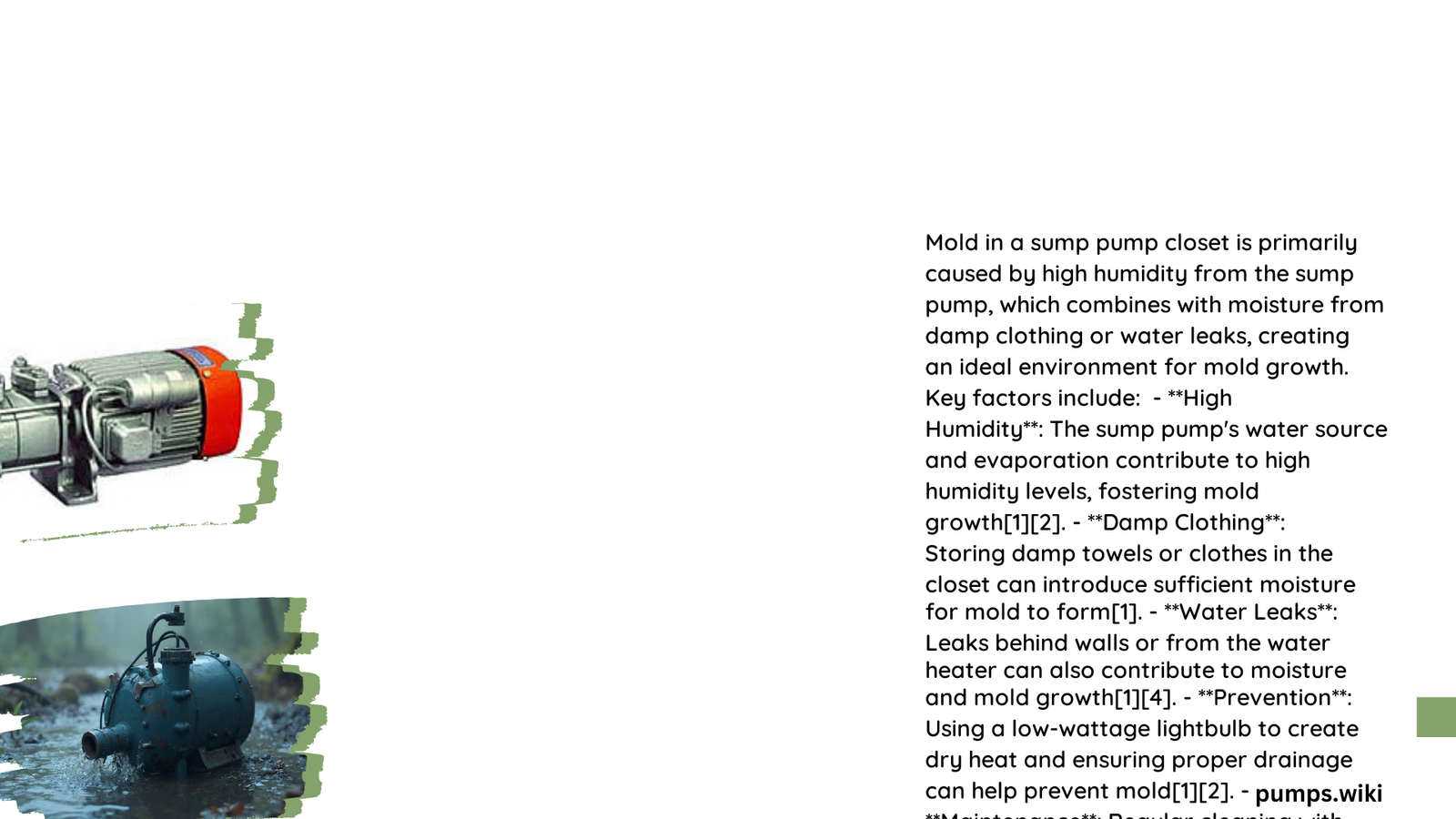Mold in sump pump closets is a common issue due to the high moisture environment. This article covers identifying mold, effective removal techniques, moisture control methods, and prevention strategies. Understanding these aspects is crucial for maintaining a healthy home environment and preventing structural damage caused by mold growth in sump pump areas.
What Are the Signs of Mold in a Sump Pump Closet?
Detecting mold early is key to preventing extensive damage. Here are the primary indicators:
Visual Clues
- Black, green, white, or brown spots on walls, ceilings, or surfaces
- Peeling, bubbling, or discolored paint
- Water stains or dampness
Olfactory Indicators
- Musty, earthy odor
- Persistent damp smell
Moisture Measurements
- Humidity levels above 50%
- Damp or wet surfaces
How to Remove Mold from a Sump Pump Closet?

Removing mold requires careful preparation and execution:
- Safety First:
- Wear protective gear (gloves, mask, goggles)
-
Ensure proper ventilation
-
Containment:
-
Seal off the area with plastic sheets
-
Cleaning Process:
- Scrub surfaces with mold-killing solution
-
Rinse and dry thoroughly
-
Drying:
- Use dehumidifiers and fans
- Allow 24-48 hours for complete drying
Cost Breakdown
| Method | Estimated Cost |
|---|---|
| DIY | $50 – $130 |
| Professional | $500 – $2,000+ |
What Are Effective Moisture Control Techniques for Sump Pump Closets?
Controlling moisture is crucial for preventing mold growth:
- Maintain humidity below 50%
- Use a dehumidifier (30 pints/day capacity for small closets)
- Improve ventilation:
- Install a low-wattage incandescent bulb
- Ensure proper discharge line placement
Dehumidifier and Ventilation Costs
- Dehumidifier: $50 – $200
- Ventilation improvements: $0 – $100
How to Prevent Mold Growth in Sump Pump Closets?
Preventive measures are key to long-term mold control:
- Regular Maintenance:
- Weekly checks for moisture and mold
-
Clean sump pump every 3-6 months
-
Environmental Monitoring:
- Use a humidistat to track humidity levels
-
Regularly inspect for water leaks
-
Product Recommendations:
- Small-space dehumidifier
- Low-wattage incandescent bulb for dry heat
What Are the Health Risks Associated with Mold in Sump Pump Closets?
Mold exposure can lead to various health issues:
- Respiratory problems
- Allergic reactions
- Skin irritation
- Headaches and fatigue
Individuals with pre-existing conditions or weakened immune systems are at higher risk.
How Does Mold in Sump Pump Closets Affect Home Value?
Mold presence can significantly impact property value:
- Decreased Market Value:
- Potential buyers may be deterred
-
Repairs and remediation costs can be substantial
-
Inspection Issues:
- Mold can fail home inspections
-
May complicate or prevent sales
-
Long-term Structural Damage:
- If left untreated, mold can cause extensive damage
What Are the Legal Implications of Mold in Sump Pump Closets?
Understanding legal aspects is important for homeowners:
- Disclosure Requirements:
-
Many states require sellers to disclose known mold issues
-
Landlord Responsibilities:
-
Landlords may be liable for mold-related health issues in rental properties
-
Insurance Coverage:
- Standard policies often exclude mold damage
- Specific mold coverage may be necessary
How to Choose a Professional Mold Remediation Service?
When DIY isn’t enough, consider professional help:
- Certifications:
-
Look for IICRC or NORMI certified professionals
-
Experience:
-
Choose companies with specific experience in sump pump closet mold
-
Insurance:
-
Ensure the company is fully insured
-
Detailed Plan:
-
Request a comprehensive remediation plan
-
Guarantees:
- Ask about post-remediation testing and guarantees
By addressing these aspects of mold in sump pump closets, homeowners can effectively manage and prevent mold growth, ensuring a healthier living environment and maintaining property value.
References:
1. UGA Extension – Mold and Moisture Home Inspection Checklist
2. Bust Mold – Mold in Closet
3. PUR360 Solutions – What To Know About Sump Pumps, Water Damage And Mold
